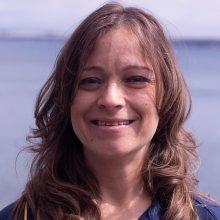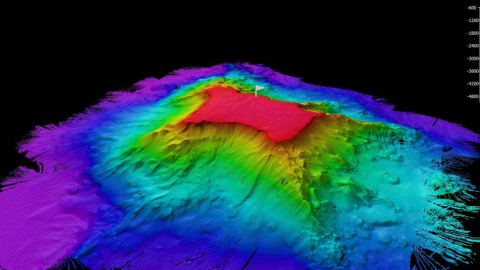
Cassi Weathersbee
Tell us about your work/research. What kinds of things do you do?
I am an Earth Science and Oceanography high school teacher. My Earth Science course allows me to discuss and explore topics from the formation of the Earth and the processes still actively changing it, to distant galaxies revealed by the Hubble Space Telescope. In my oceanography course, I can delve into issues impacting one of my earliest passions, our world’s ocean. Every day I am able to learn something new. I strive to give my students opportunities to experience authentic science beyond the textbook and classroom. Through hands-on activities, I get to watch my students make connections between their own prior experiences and new learning. There is nothing better than watching students “get it.” Helping them grow and become more confident in their abilities is a major reason why I am a teacher. They make my job fun and exciting.
What sparked your initial interest in your career?
I started studying computer science in college because I like problem-solving. However, as I was finishing my degree I realized I enjoyed working with young people more than computers. I decided to switch my focus and earned my master's degree in education. Teaching allows me to use my problem-solving abilities to figure out how to best design learning experiences to teach students different skills while making the lessons engaging for them. I began teaching in an elementary school, and while I enjoyed all of the core subjects, I particularly enjoyed teaching science. The fifth-grade science curriculum included an oceanography unit. I invited in scuba divers and walked the fifth graders through a mock-dive which included breathing using scuba tanks and watching videos of ocean animals taken by the scuba divers. The students were so excited to be able to ask questions and get an idea of what it would be like to scuba dive themselves. I was hooked. I began taking classes on various science topics. Eventually, I moved into middle school as a science teacher where I continued to focus on developing my understanding of scientific research and methods of sharing this research with students in meaningful ways. I decided to teach high school Earth Science and Oceanography to share my enthusiasm for learning and scientific research with older students. I hope I will encourage more students to pursue STEM careers.
Who influenced you or encouraged you the most?
My children and my husband have always encouraged and supported me. My son and daughter inspired me to pursue a career as a teacher. They always asked questions and practically lit up when they learned something new as they explored their world. I knew I wanted to see that look of accomplishment and joy every day. Even though they are grown and living on their own they still ask questions and encourage me to geek out over science and exploration. My husband encourages me to try new things I can take back to my students. Whether my adventures take me tracking through our National Parks as a park ranger for the summer, to Jefferson Lab’s particle accelerator, or exploring the depths of our ocean aboard the Nautilus, he is always pushing me to learn more and to do more. This is a message that has become fundamental in my classroom.
What element of your work/study do you think is the most fascinating?
The most fascinating thing I get to do is connect students with the natural world around them. Recently I took a group of ninth grade students to the Shenandoah National Park where we collected red-backed salamanders and compared the habitats of this common species with the endangered Shenandoah salamander. This study focused on how climate change is adversely impacting the Shenandoah salamander while possibly aiding the red-backed salamander. Bringing students out into the field allows them to make personal connections to what they are learning in the classroom. I cannot get enough of the “wow” and “that was so cool.” Knowing I helped foster a desire to explore and protect our world is one of the best aspects of my job.
What other jobs led you to your current career?
My first job was as a fourth-grade teacher. As an elementary teacher, I was expected to teach language arts, social studies, mathematics, and science. I was extremely lucky to work with a dedicated team of other fourth grade teachers. We shared resources and developed ideas together. Science, however, seemed to be a subject lacking in engaging lessons. This drove me to seek out new captivating hands-on activities I could share with my students and my team. Through this experience, I discovered my love for science education. After leaving elementary I have focused on teaching science classes in both middle and high schools. My pursuit of learning new ways to engage students and keep up-to-date with science research has allowed me to experience things I never dreamed I would. I have been weightless on the Zero Gravity plane, built a hovercraft and a six-foot-long wave tank, walked the halls of a nuclear particle accelerator, and designed lessons to connect hundreds of students to the National Parks. Each opportunity has allowed me to enhance the educational instruction I am able to provide my students and it pushed me to seek out new avenues to learn more about the exciting scientific research and exploration my students can be a part of.
What are your degrees and certifications?
Master of Education, NK-8 Licensure–Marymount University, Arlington, VA (2001)
Bachelor of Science, Computer Information Systems–Strayer University, Washington, DC (1999)
Postgraduate Professional Teaching License: Biology, Earth and Space Science, Physics, and Elementary Grades NK-8
What are your hobbies?
I like to spend time with my husband and two adult children. My husband and I enjoy hiking together and playing with our dogs. During the summer months, I often go scuba diving. I also adore riding my motorcycle through the Virginia countryside.
What advice would you give someone who wants to have a career like yours?
If you want to be an effective educator you must learn how to communicate effectively. Being able to explain complex concepts and ideas in ways which are relatable to a diverse population is a necessary skill. Teachers must be creative and be excellent problem-solvers. Most importantly, teachers must love learning new things. Never be afraid to admit you do not know something. Good teachers know where to go and who to ask to find information. Be willing to try new things, and do not be afraid to fail. An idea for a new lesson may or may not be a success in your classroom, but if you refuse to change, eventually most of your ideas will become out-of-date and no longer relate to your students. Exploring new ideas keeps your classes interesting and keeps you invigorated. Above all, remember that learning is an active process. You must seek out opportunities to gain new knowledge and take on challenges that force you outside of your comfort zone. Science and teaching are hands-on endeavors; roll up your sleeves and get out there.
How did you get involved with the Nautilus Exploration Program? How did you get on the ship?
I attended a National Oceanic and Atmospheric Administration (NOAA) educator professional development event and asked the presenter about opportunities that would connect teachers with oceanic researchers. She suggested I subscribe to NOAA’s electronic newsletter. It was through one of these newsletters that I learned about Nautilus Exploration Program. I knew the competition to earn a spot on the Nautilus would be fierce. I decided to go for it, after all, the worst that could happen is they say no. I submitted a letter of interest, my resume, and a sample STEM-based lesson plan. I was over the moon when I heard I made it through the first round and had secured an interview. My interview with the Nautilus education team was so much fun. I spoke about my love of teaching and the ocean. I nerded out with them about ocean exploration and methane seeps in particularly. I cannot accurately describe my level of excitement when I opened my acceptance email. The Nautilus Exploration Program is not only offering me a chance to experience scientific research first hand, it is providing me a vast new resource of ideas and lessons I can leverage to benefit my students and the students of my colleagues. I am so excited to part of this program!
Expeditions
Cassi participated in the following Ocean Exploration Trust expeditions:

